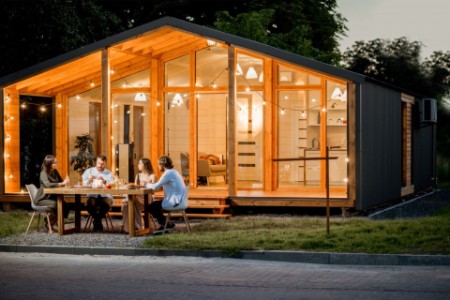Our houses are contributing big time to climate change - just by being there. In fact, they cause up to 10 percent of New Zealand’s total greenhouse gas emissions. But there’s some cool stuff happening to reduce the harm our homes cause – and even make them part of the solution. Listen to the final episode of the Net Zero: Road to 2050 podcast to find out more.
Buildings make up between 15 and 20 percent of total greenhouse gas emissions in New Zealand, depending on whose figures you use.
It’s less than other countries, because our electricity grid is greener than most. In the US, for example, the ‘built environment’ contributes almost 50 percent of emissions.
But 15-20 percent, that’s still significant.
Around half of those total emissions are from homes, and half from non-residential buildings. Cut it a different way, and half is coming from the day-to-day operations of a building (power for heating, lighting, cooling and the gear we have in our homes, for example), and half from what’s called “embedded carbon” - the emissions from the energy that was needed for construction. It might be mining or logging the materials, manufacturing the concrete, steel, glass, bricks etc, getting everything to the site, and even the use of power tools on the job.
In the final podcast of the Net Zero: Road to 2050 series Newsroom’s business editor Nikki Mandow looks at the challenges faced by homeowners and the building industry to get emissions down so we can meet our net carbon zero by 2050 targets - and save the world.
We aren’t doing great so far - but there’s some cool stuff in the wings.
Technology is going to play a big role in how our homes can help us create fewer emissions, save on electricity, and hopefully stave off the need to build more power stations.
We’re going to need more solar panels, batteries, and smart appliances, plus a much more proactive electricity grid, able to easily move power out of, as well as into, homes.
On the podcast Nikki goes to meet Nic Romaniuk, a technophile homeowner just itching to get his hands on the new gear.
New Zealand is also going to need better pricing signals, more information sharing, a shift in the regulations, and some potentially big changes in the way the electricity market operates, if we are going get maximum emissions reduction, says Angela Ogier, Director of Energy and Hydrogen Transition at EY New Zealand.
“What we should be aiming for is the smarts to manage those things, including home management systems to make it easy for us.
“That technology will come in time. But it needs the infrastructure to be built. And it needs the price signals to be there in the market.”
But it’s not just about technology, Andrew Eagles, Chief Executive of the New Zealand Green Building Council, tells Nikki on the podcast.
Just making every house more efficient will also have a huge impact on the emissions associated with operating a home, and on houses playing a part in getting rid of our remaining coal and gas-fired electricity generation.
“Research from Otago University found one of the major issues with our grid, and the reason we have blackouts and turn on Huntly power station, is our peak load. And the peak load is directly correlated with when we turn on our energy needs in New Zealand homes in the winter,” Eagles says.
“Lots of commentators talk about needing more hydro dams, or more wind turbines. But the reality is that we could reduce that peak load by over 70 percent if we built low carbon homes, and retrofitted our existing homes to energy efficient levels.”
Finally, Nikki visits the Fletcher Building’s Low Carbon 1.5 degree Homes pilot, where a team is trying to work out how to align the way we build and operate our homes with a future where we keep global warming to 1.5 degrees above pre-industrial levels.
Construction hasn’t started yet, but the head of the project, Nicola Tagiston, explains what they have discovered in 18 months of data-driven research into every aspect of building and running a home. You’ll be surprised.
Net Zero: The Road to 2050 is a six-part Newsroom podcast series, made in collaboration with EY. Business editor Nikki Mandow looks at some of the most interesting, critical and sometimes confusing ways in which New Zealand is tackling climate change. Our fortnightly episodes attempt to demystify some of the complex issues involved in the push to get Aotearoa to net zero emissions by 2050.
Podcast
Episode 06
Duration 30m 00s
Our latest thinking
In this series
Show all podcastsWhen green is a dirty word
Episode 05
Presenters
EY NZ Climate Change and Sustainability Services Director


